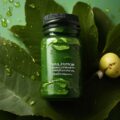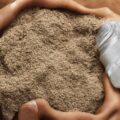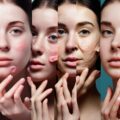Understanding Whiteheads: A Compassionate Approach to Skin Care
Dealing with whiteheads can be a challenging and sometimes frustrating experience. These small, white bumps that appear on our skin often leave us feeling self-conscious and searching for solutions. However, it’s important to approach skincare with compassion and understanding, recognizing that our skin is a reflection of our overall health and wellbeing. In this guide, we’ll explore gentle and effective ways to address whiteheads while nurturing both our skin and our self-esteem.
The Nature of Whiteheads: What Are They Really?
Whiteheads, also known as closed comedones, are a type of acne that occurs when hair follicles become clogged with oil and dead skin cells. Unlike blackheads, which are open at the surface, whiteheads are closed by a thin layer of skin, giving them their characteristic white appearance. It’s crucial to understand that whiteheads are a natural occurrence and not a reflection of poor hygiene or personal failure. Our bodies are complex, and sometimes these small blemishes are simply part of our skin’s natural processes.
Nurturing Your Skin: Gentle Cleansing Techniques
When it comes to addressing whiteheads, gentle care is key. Harsh scrubbing or aggressive treatments can irritate the skin and potentially worsen the condition. Instead, opt for a mild, non-comedogenic cleanser that won’t clog pores. Cleanse your face twice daily using lukewarm water and your fingertips, gently massaging in circular motions. Remember, your skin deserves kindness and patience. After cleansing, pat your skin dry with a soft towel rather than rubbing, which can cause irritation.
Embracing Exfoliation: A Balancing Act
Exfoliation can be a helpful tool in managing whiteheads, but it’s important to approach it with care. Over-exfoliation can strip the skin of its natural oils and lead to irritation. Consider using a gentle chemical exfoliant, such as salicylic acid or glycolic acid, once or twice a week. These ingredients can help to unclog pores and promote cell turnover without physically scrubbing the skin. As you incorporate exfoliation into your routine, listen to your skin and adjust the frequency based on how your skin responds.
Nourishing Your Skin from Within
While topical treatments can be effective, true skin health begins from within. A balanced diet rich in fruits, vegetables, and hydrating foods can support your skin’s natural processes. Stay well-hydrated by drinking plenty of water throughout the day. Remember, your skin is your body’s largest organ, and it reflects your overall health. By nourishing your body with wholesome foods and adequate hydration, you’re supporting your skin’s ability to heal and maintain balance.
The Power of Self-Care and Stress Management
Stress can have a significant impact on our skin, potentially exacerbating conditions like whiteheads. Incorporating stress-management techniques into your daily routine can not only benefit your overall wellbeing but also support healthier skin. Consider practices such as meditation, yoga, or deep breathing exercises. These activities can help reduce stress hormones in the body, which may in turn help to balance oil production and promote clearer skin. Remember, self-care is not selfish – it’s an essential part of maintaining both physical and emotional health.
Frequently Asked Questions
1. Are whiteheads a sign of poor hygiene?
No, whiteheads are not a sign of poor hygiene. They are a natural occurrence caused by clogged pores and can happen to anyone, regardless of how clean their skin is.
2. Can I pop whiteheads at home?
It’s generally not recommended to pop whiteheads at home, as this can lead to inflammation, scarring, and potential infection. Instead, focus on gentle skincare practices and consult a dermatologist if needed.
3. How long does it typically take for whiteheads to go away?
The duration can vary, but with consistent, gentle care, whiteheads often improve within a few days to a couple of weeks. Remember, healing takes time, and patience is key.
4. Are there any natural remedies for whiteheads?
Some people find success with natural remedies like tea tree oil or honey, which have antimicrobial properties. However, it’s important to patch test any new product and use them in moderation.
5. When should I see a dermatologist about whiteheads?
If your whiteheads are persistent, painful, or affecting your quality of life, it may be time to consult a dermatologist. They can provide personalized advice and treatment options.
Embracing Your Skin’s Journey
As we conclude this guide on whitehead removal, it’s important to remember that perfect skin is a myth. Our skin changes throughout our lives, responding to internal and external factors. Instead of striving for flawless skin, focus on nurturing and caring for the skin you have. Treat your skin with kindness, and extend that compassion to yourself. Your worth is not determined by the presence or absence of whiteheads or any other skin condition. By approaching skincare with patience, gentleness, and self-love, you’re not just working towards clearer skin – you’re cultivating a healthier relationship with yourself.









